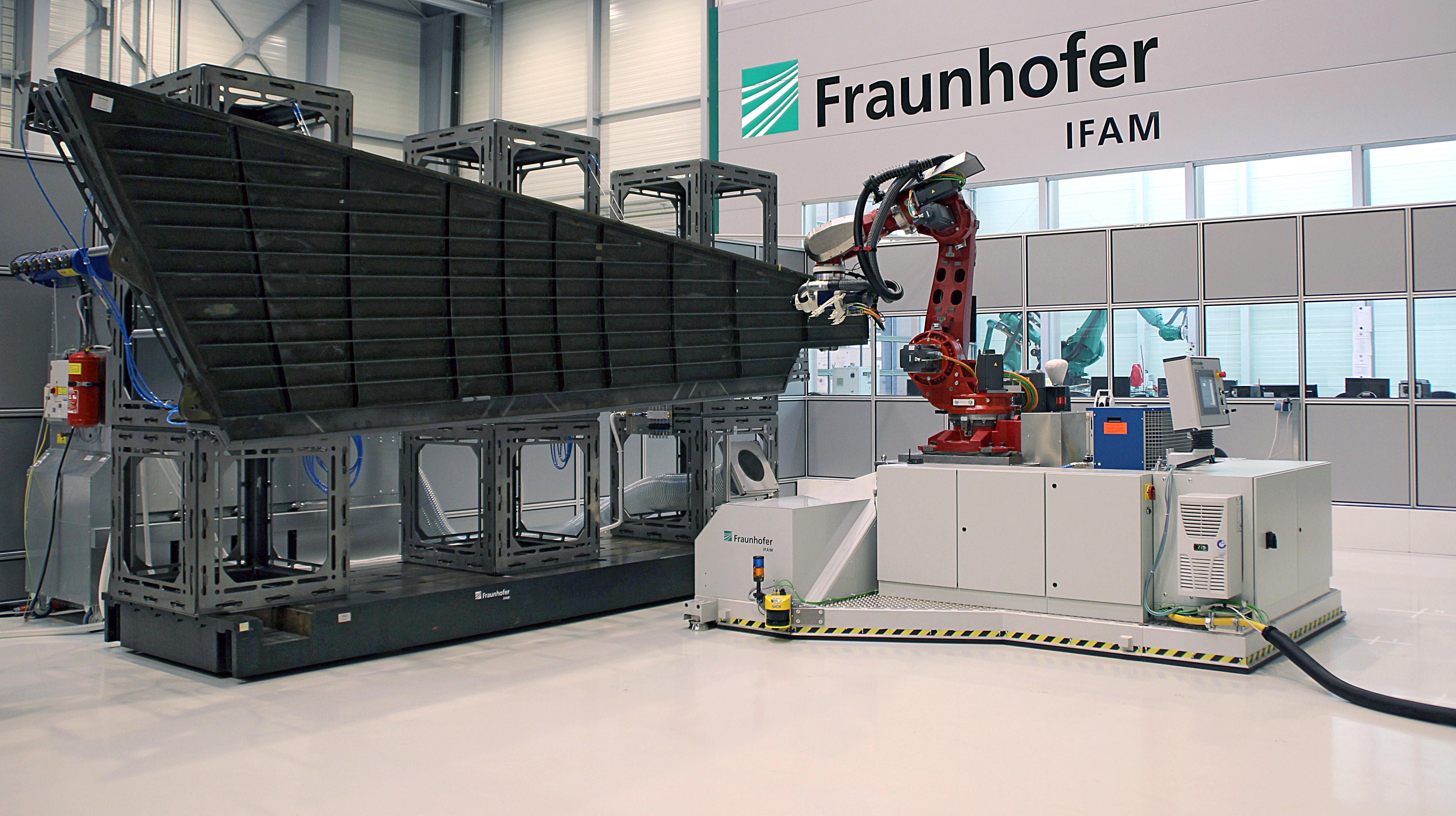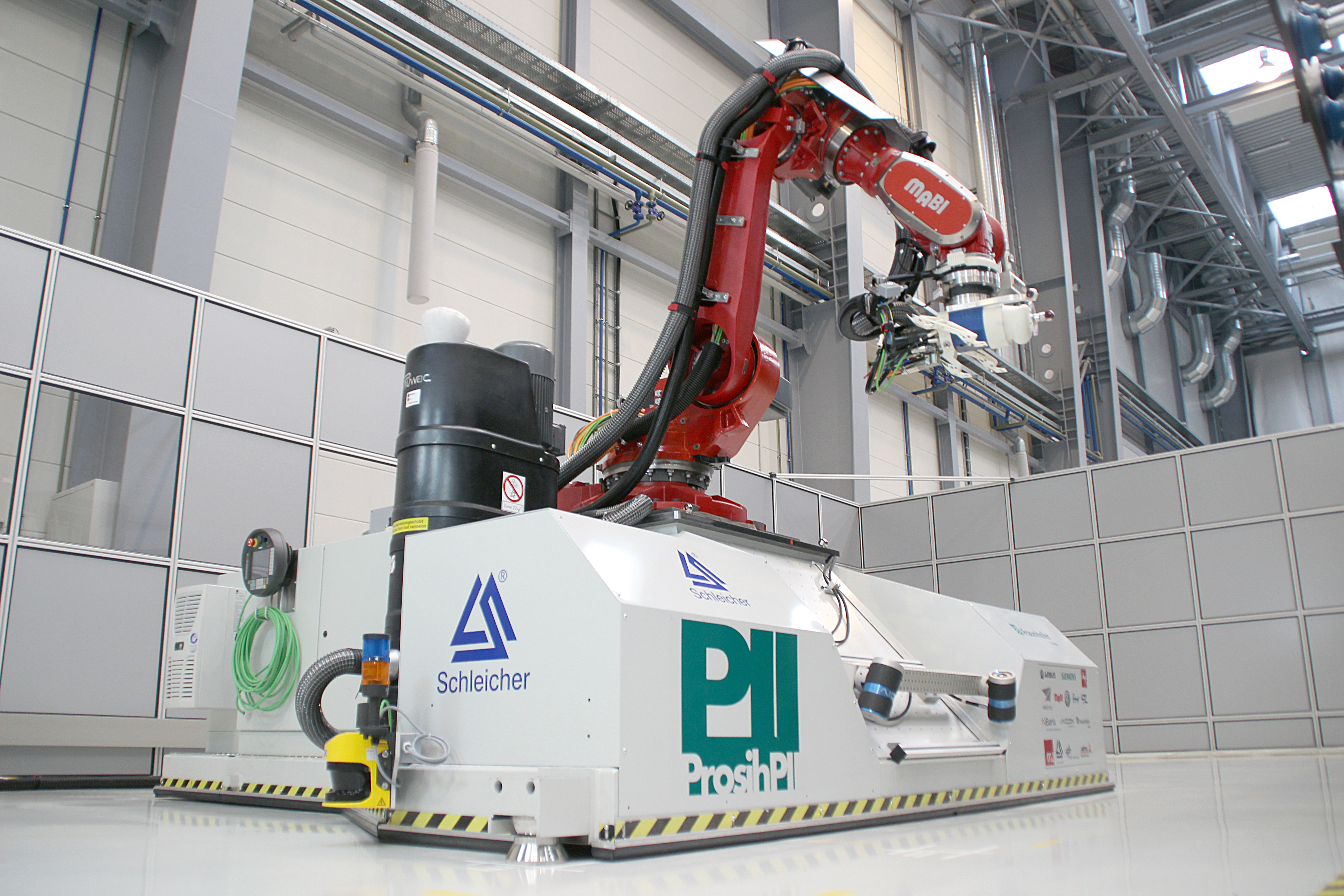Robot on demand: Mobile machining of aircraft components with high precision
Within the framework of Industrie 4.0 the aircraft manufacturing industry has embarked on an automation offensive. This involves moving away from customized machinery for special processes towards universal mobile robots. The ProsihP II project "Efficient, highly productive, precision machining of large CFRP structures", which was funded by the State of Lower Saxony, involved experts from a wide range of disciplines who set out to develop technology for the mobile, high-precision machining of large CFRP components using robots working in parallel. Spurred on by their own innovation, the project team has now achieved the ambitious objective of the project. Last week Fraunhofer IFAM scientists and their project partners presented the intelligent milling system at Research Center CFK NORD in Stade.


The conventional portal machines currently in use are expensive and do not allow rapid measuring and parallel processing. When processing carbon fiber reinforced plastics (CFRPs) in particular, the process monitoring cannot prevent machining errors, resulting in irreparable damage to materials and high reject rates and associated costs.
The objectives of the ProsihP II project, carried out over the last three years, were therefore very clear:
- To develop a modular system of mobile robots that can adapt to components of almost any geometry and size.
- To be able to use several robots simultaneously in order to facilitate much more rapid machining of large CFRP components.
- Adaptability such that mobile robot systems with interchangeable end effectors can be used for a range of other processes.
- The development of a high-precision robot which due to its accurate positional guidance opens up new fields of application.
- Continuous process monitoring whereby, if there is an increased risk of errors, the system returns to a safe process window before any damage arises.
A mobile platform for industrial robots was designed in order to realize a very versatile machine concept and give the desired degree of freedom for positioning the machining systems on components. A prerequisite for good machining results here is adequate static and dynamic stability. In collaboration with the project partners, the automation team at Fraunhofer IFAM designed and built a mobile platform suitable for interchangeable heavy-duty robots from all manufacturers. The cost-efficient mobile platform was constructed from standard, commercially available components and is firmly positioned on the floor for the machining work with the aid of three supports. This prevents any destabilization of the platform. To change location, the platform extends its three wheels over the supports. The whole structure has total freedom of movement and can even turn on the spot.
Industrial robots of up to three tonnes in weight can be mounted on the universal connection plate of the mobile platform. The project requirements on the absolute positioning and path precision of the total system, which comprised the robots and mobile platform, were so high that it was necessary to significantly increase the accuracy of the selected robots. To achieve this, the robot kinematics were fitted with a CNC control system (Siemens SINUMERIK 840D sl), compatible motors, and secondary encoder systems on each axis for correcting positional deviations. In addition, an advanced camera system registers the actual position of the robot, so allowing real-time correction by comparison with target data. The final result of the development work is one of the most precise machining robots in the world.
Both the procedure employed and the technological components have the advantage that they can be employed for any robot kinematics. A significant step was thus taken towards a standard for absolutely accurate robots in the aircraft manufacturing industry.
At the end of the development phase, the self-adaptation of robot-based milling processes to different component geometries and positions was successfully tested on a 7 x 2 meter CFRP vertical tail plane shell of an Airbus A320. The system is, however, also designed for much larger components of up to 30 meters. It can, for example, be used for machining of various primary aircraft structures such as wing and fuselage sections. Furthermore, with only minor modification, the mobile robot system can be used, for example, for machining wind turbine rotor blades, sections of rail vehicles and large components for shipbuilding.
Project partners:
Aicon 3D Systems GmbH, Airbus Operations GmbH, Artis GmbH, CTC GmbH Stade, IPMT der TU Hamburg, Ludwig Schleicher Anlagenbau GmbH, Mabi AG, mz robolab GmbH, Siemens AG, and Volkswagen AG
Funding:
Fraunhofer IFAM wishes to thank the Lower Saxony Ministry for Economic Affairs, Employment, and Transport, the NBank as well as the Deutsches Zentrum für Luft- und Raumfahrt e.V. (DLR) for funding the ProsihP II project (ZW 3-80140004).
Last modified:
 Fraunhofer Institute for Manufacturing Technology and Advanced Materials IFAM
Fraunhofer Institute for Manufacturing Technology and Advanced Materials IFAM